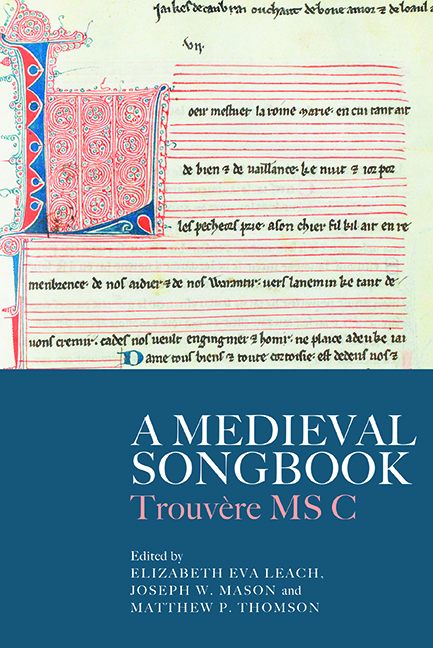Book contents
- Frontmatter
- Contents
- List of Illustrations
- List of Music Examples
- List of Tables
- List of Contributors
- Acknowledgements
- Abbreviations
- Editorial Practices
- Introduction
- Chapter 1 The Trouvère Manuscripts of the Burgerbibliothek Bern
- Chapter 2 The Lorraine Repertoire of C
- Chapter 3 Chansonnier C: Contents, Stemmatic Position, Particularities
- Chapter 4 A Note on the Decoration of C and its Artistic Context
- Chapter 5 Author Ascriptions and Genre Labels in C
- Chapter 6 Common Exemplars of U and C
- Chapter 7 Shared Small Sources for Two Early Fourteenth-Century Metz Chansonniers?
- Chapter 8 The Legacy of Thibaut de Champagne in C
- Chapter 9 Strategies of Appropriation in Jacques de Cambrai's Devotional Contrafacts
- Chapter 10 Jeux-Partis and their Contrafacts in C
- Chapter 11 C and Polyphonic Motets: Exemplars, Adaptations, and Scribal Priorities
- Appendix: List of Songs in C
- Bibliography
- Index of Sources
- Index of Songs
- General Index
- Studies in Medieval and Renaissance Music
Chapter 10 - Jeux-Partis and their Contrafacts in C
Published online by Cambridge University Press: 26 May 2022
- Frontmatter
- Contents
- List of Illustrations
- List of Music Examples
- List of Tables
- List of Contributors
- Acknowledgements
- Abbreviations
- Editorial Practices
- Introduction
- Chapter 1 The Trouvère Manuscripts of the Burgerbibliothek Bern
- Chapter 2 The Lorraine Repertoire of C
- Chapter 3 Chansonnier C: Contents, Stemmatic Position, Particularities
- Chapter 4 A Note on the Decoration of C and its Artistic Context
- Chapter 5 Author Ascriptions and Genre Labels in C
- Chapter 6 Common Exemplars of U and C
- Chapter 7 Shared Small Sources for Two Early Fourteenth-Century Metz Chansonniers?
- Chapter 8 The Legacy of Thibaut de Champagne in C
- Chapter 9 Strategies of Appropriation in Jacques de Cambrai's Devotional Contrafacts
- Chapter 10 Jeux-Partis and their Contrafacts in C
- Chapter 11 C and Polyphonic Motets: Exemplars, Adaptations, and Scribal Priorities
- Appendix: List of Songs in C
- Bibliography
- Index of Sources
- Index of Songs
- General Index
- Studies in Medieval and Renaissance Music
Summary
In studies of the jeu-parti, a genre of vernacular sung debate composed and copied in northern and eastern France from the 1230s to the 1310s, scholars have tended to focus on the largest material collections of debate songs. These are the deluxe chansonniers whose provenance is assumed to be the Arras puy: chansonniers a (seventy-nine jeux-partis), A (thirty-two) and Z (twenty-four). The small selection of jeux-partis in chansonnier C has not been widely examined, in part because of the lack of musical notation in the source, which has deterred any serious musicological study. The jeux-partis in C have suffered, too, from scholarly neglect because of the source's eastern provenance. Arthur Långfors, for example, groups jeux-partis from chansonniers C, I, O, and U together at the end of his landmark edition of jeu-parti texts, literally presenting jeux-partis from these eastern manuscripts as peripheral to his conception of the genre. In a passage that characterises the contents of I (and by extension, C) as late, over-ripe, epigonist, and parodic, Langfors effectively dismisses the jeux-partis of eastern chansonniers as objects unworthy of scholarly attention, a characterisation that has left its mark on scholarship today.
While the jeux-partis of C have largely been ignored by twentieth-century scholars, the scribes and compilers of C considered jeux-partis to be of great importance to the songbook that they were making. At the start of each letter-section, scribes copied a devotional song, as Paola Moreno explains in her contribution to this volume (Chapter 3). The genre of the next song to be copied varies between letter-sections, but frequently it is a jeu-parti that is then copied. This suggests that scribes considered the genre of the jeu-parti to be of no less importance than grand chant or the pastourelle: C stands in contrast to other trouvère chansonniers organised by genre, such as a, A, Z, W, or I, in which grands chants are copied first and jeux-partis occupy the less-prestigious second or third place. The jeux-partis of C therefore offer a very different perspective on the role of the jeu-parti in thirteenth-century musical life. This chapter considers the jeux-partis of C in relation to the wider corpus of jeux-partis, and, through a close reading of one jeu-parti contrafact group, shows the extent to which C might have been embedded in networks of musical exchange.
- Type
- Chapter
- Information
- A Medieval SongbookTrouvère MS C, pp. 174 - 191Publisher: Boydell & BrewerPrint publication year: 2022



